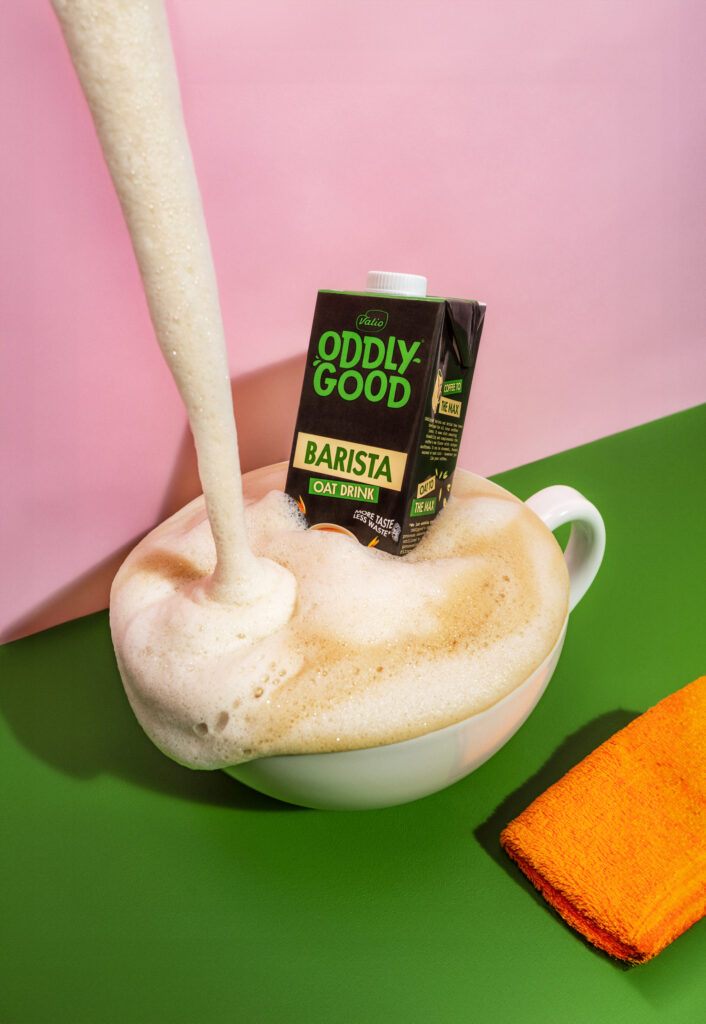
A new survey has found that over half of Brits who have stopped drinking plant-based milk are willing to return to the category – here’s how brands can win them back.
Many people may have stopped drinking non-dairy milk recently, but it doesn’t mean they’re done with the category.
That’s the gist of a new survey by Oddlygood, the Finnish plant-based milk company that bought UK-based Rude Health last year. It polled 2,000 Brits, categorising them as non-users, lapsed consumers or infrequent drinkers (less than twice a month), and asked if they’d come back.
Among the second group – those who have given up these products in the last 12 months – more than half (53%) said they would. In fact, three in five (62%) remain positive about plant-based milk, a welcome sign for a category that saw sales contract by 3% between January 2024 and 2025.
“After years of rapid growth, plant-based drinks have entered a natural phase of consolidation,” Oddlygood CEO Niko Vuorenmaa tells Green Queen.
“Our research shows this slowdown isn’t about rejection – it’s about unmet expectations. Consumers want great taste, clear benefits, and products that feel worth the price,” he explains. “When those expectations aren’t met, they step back – but they haven’t given up on the category.”
Lapsed consumers need credible on-pack health assurances

The survey uncovered “particularly strong” opportunities to win back lapsed users, a predominantly young group (half are under 35 years of age).
There was one clear takeaway from the results: health is top of consumers’ minds. While 58% of lapsed consumers say they understand the health benefits of oat milk and the like, clear and accredited on-pack health information would draw 28% back towards these products, making it the most influential driver. Taste and price, at 26% each, aren’t far behind.
Lapsed consumers are still open-minded,” says Vuorenmaa. “The key is rebuilding trust. That means delivering on quality, communicating nutrition clearly and confidently, and giving them reasons to enjoy plant-based again through flavour innovation and consistency. It’s about showing them that plant-based can be delicious, exciting, and worth their investment.”
Infrequent users exhibited similar motivations, with clear on-pack health details attracting 33% of them, followed by confidence that plant-based milks contain natural ingredients (27%). In contrast, taste is the top factor that would entice people who’ve never tried these products (cited by 22%), followed by price (19%).
Recent research by the Good Food Institute Europe revealed that a third of consumers want to cut back on animal proteins, and 38% want to increase their plant-based consumption. High costs (25%) and health concerns (24%) are the primary factors driving Brits away from meat and dairy, followed by changing taste preferences (19%).
The Oddlygood poll found that taste and health are also key barriers to the consumption of vegan yoghurts and desserts, and quality concerns are more pronounced for these formats than milk alternatives.
Over a fifth (22%) of lapsed users feel they’re paying more for an inferior product, and a similar share believe non-dairy versions taste artificial or too bland. Addressing their quality perceptions is key to bringing these consumers back, according to Oddlygood.
Coconut milk could be the surprising draw for non-users

“Real growth won’t come from preaching to the converted, but from engaging the consumers outside the category,” says Vuorenmaa. While lapsed users need reassurance, non-users need persuasion.
“For lapsed users, the job is to rebuild confidence by focusing on quality, consistency and transparency – giving them a reason to rejoin the category,” he explains. “For non-users, it’s about bold, creative communication that challenges outdated perceptions of taste and functionality. Brands can’t do that alone – this is where collaboration across the industry becomes vital.”
Though oat milk is by far the most popular milk alternative in the UK, the option that appeals most to non-users is actually coconut milk (13%). Oddlygood, which spun off from dairy giant Valio in 2018, argues that this remains an “untapped entry point” into the category – indeed, coconut milk only made up 5% of the category’s sales last year.
“Coconut is familiar, delivers indulgent taste, and works well in both hot drinks and cooking. For non-users, this approachability is massively important,” Vuorenmaa highlights, adding that Rude Health’s organic coconut milk is its top-selling SKU and the number-one coconut product in the category.
Nearly a third (32%) of British households bought a plant-based milk product in 2024, up from the previous two years. It is the largest segment of the country’s plant-based sector, and also accounts for nearly 7% of the overall dairy market. Barista-style milks have been particularly successful, witnessing a 10% uptick in sales. So the numbers show the category remains strong and retains potential.
Rude Health itself has seen strong momentum after its acquisition in October 2024, outperforming the category with 22% growth. “That tells us that there’s real consumer appetite for brands that deliver flavour, transparency and a strong identity,” says Vuorenmaa.
“Oddlygood continues to grow globally at over 40% year-on-year,” he adds. “2025 has been a pivotal year as we bring Rude Health into the Oddlygood Group family – together, we’re better positioned than ever to drive category growth, engage new consumers and raise the bar on taste and quality across Europe.”
The post How Plant-Based Milk Brands Can Win Back Consumers appeared first on Green Queen.
This post was originally published on Green Queen.